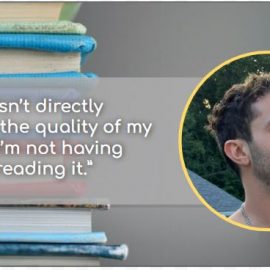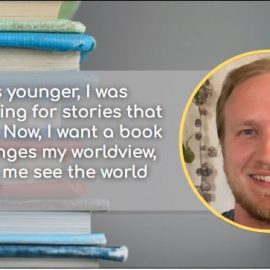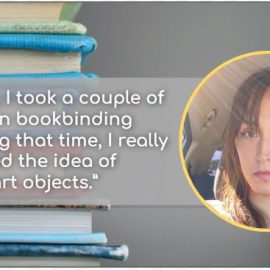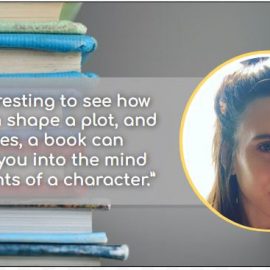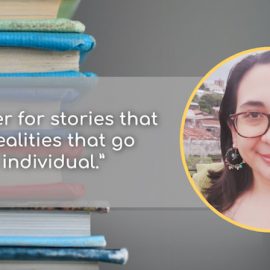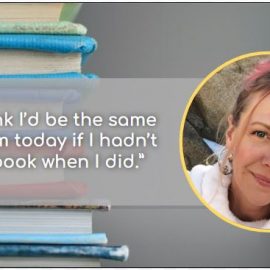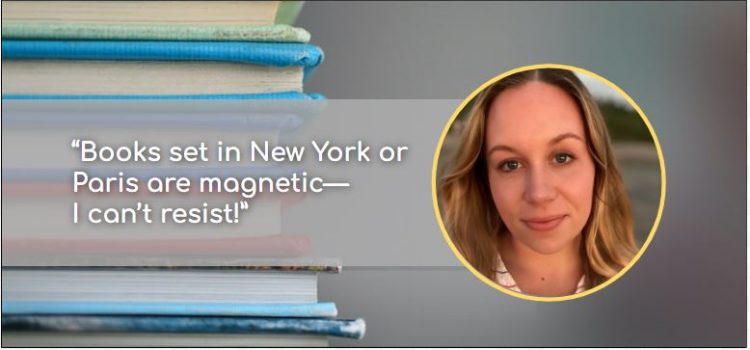
What genre is the perfect blend between escapism and learning? What book completely changed how Chelsea looks at accomplishments?
Chelsea is a Shortform guide editor from California. She’s always been a huge fan of fiction, but, since working at Shortform, her reading tastes have broadened.
Our Interview With Chelsea
Here’s what Chelsea had to say about her evolving reading tastes, her guilty pleasure, and the book that changed the way she parents.
What’s your favorite book and why?
I can’t choose just one. Historically, my favorite is probably 1984 by George Orwell because of how thought-provoking it is. My favorite fiction book in recent years is Exile Music by Jennifer Steil—it strikes the perfect balance between a great story and poetic language, which is very rare in my opinion. My favorite nonfiction book is either Mindset by Carol Dweck or On Writing by Stephen King, but I could name probably twenty others that could fight for a spot in the top three.
What are you reading these days?
I’m usually reading at least one fiction and one nonfiction book at the same time. The last books I finished were Things Past Telling by Sheila Williams and Start With Why by Simon Sinek. Currently, I’m reading Wild by Cheryl Strayed and Access to Power by Julie Kelliher. Next, I’m going to read Big Magic by Elizabeth Gilbert and a fiction book I haven’t chosen yet!
If you could have a dinner party with any three authors—dead or alive—who would they be and why?
Ernest Hemingway, F. Scott Fitzgerald, and Zelda Fitzgerald. I have other authors I like more, but those three would be so much fun to hang out with.
What’s your favorite genre and why does it intrigue you?
Historical fiction is my favorite genre—it’s the perfect blend between escapism and learning. I’m particularly drawn to books with strong female characters and anything that takes place between the 1920s and 1970s. Books set in New York City or Paris are magnetic—I can’t resist! Usually, when I read one book, I’ll go down a rabbit hole and end up researching the location, the people, and the event. Afterward, I’ll read a few more books on the same topic or set in the same time period. After I read The Nightingale by Kristin Hannah, I got really into World War II books for a while. It led me to Exile Music, which is now one of my favorite books of all time.
Are there any book genres or tropes that you dislike or refuse to read?
I’m not a fan of romance. The storylines don’t bother me as much as the word choices—I think they’re often too cheesy and unrealistic, and it takes me out of the story.
What’s your favorite way to read a book?
A physical copy is my favorite, mostly because of the smell. “Old book” is my favorite smell in the world. But, I also have a Kindle, which I love, because it’s convenient to take with me in my purse and I like being able to download books as soon as I want them. I enjoy audiobooks while I’m exercising or on a road trip, but, outside of those situations, I much prefer the visual versions.
What book do you think everyone should read in their lifetime?
The Curious Incident of the Dog in the Night–Time by Mark Haddon. It takes a little while to get into because it’s written from the perspective of an autistic teen and it’s a mind trip. But, after a while, you click in and suddenly feel like you’re living inside his brain. It’s a great exercise in seeing things through a unique lens.
Who are your favorite authors?
One of my favorite authors is Fiona Davis. I’ve read almost everything she’s written, and it’s all been great. She’s a historical fiction writer—all of her books are about one place from two characters’ perspectives, usually involving a mystery of some kind. I also love Graeme Simsion—author of The Rosie Project—and Colm Toíbín—author of Brooklyn. I’ve read several books from both of those authors and have been impressed and satisfied every time.
How have your reading tastes changed over the years?
I’ve always read fiction and nonfiction, but, since joining Shortform, my nonfiction reading has broadened quite a bit. Especially now that I’m editing, I’m getting exposed to more and more content that I might not have explored on my own. For example, I just finished editing a guide on When the Body Says No, and a lot of the commentary was from The Obesity Code. Now they’re both on my reading list, and they aren’t something I would’ve read in previous years.
Was there a specific book that sparked your love of reading?
I’ve loved reading for so long that I don’t remember when it started. As a child, my mom read with me and my brothers every night before bed. I’m sure that the ritual and quality time helped nurture my love for reading, so I do the same with my kids. The first book that I remember feeling really special was A Little Princess by Frances Hodgson Burnett. As a child, I loved books about kids being independent—The Boxcar Children, The Baby-Sitters Club, and Goosebumps all were favorites. After my parents would tell me to turn off the light, I used to sit in my closet and read all night with a flashlight.
Do you have any guilty pleasure books?
I love to read memoirs of people I don’t necessarily respect. It can be fun to read about a life I would never choose for myself. For example, one of my favorite reads was Down the Rabbit Hole by former playboy bunny Holly Madison. It doesn’t sound very intellectual to recommend books like that to people, but they’re a blast—haha!
Have any books you’ve read caused you to make any life changes or to change or develop any habits?
Mindset by Carol Dweck completely changed the way I see my accomplishments and how I raise my children. I was one of those “gifted” children who was praised all my life for doing well without trying. As a result, I found myself without tenacity once I was actually challenged in adulthood. After reading that book, I understood the ways I was holding myself back, and I changed them. Tenacity is one of my strongest qualities now, and I make deliberate efforts to instill it in my children.
What are your favorite book adaptations?
I don’t usually like book adaptations, but I think they did a really good job with the first two movies of The Hunger Games series. The casting was excellent, and they didn’t change anything important.
At Shortform, how do you go about working on a book that has viewpoints you don’t agree with?
I have an extremely eclectic group of family and friends. For example, I’m from Texas but was raised in California. I went to college in San Francisco and am married to a former Marine from Oregon. Because of this, I can almost always picture someone I love agreeing with the perspective I find fault in. I’ve also always loved the quote from F. Scott Fitzgerald that says, “The test of a first-rate intelligence is the ability to hold two opposing ideas in mind at the same time and still retain the ability to function.” Working on a book I disagree with is an exercise for my brain and encourages empathy in my relationships.
Are there any books you had to read for Shortform that you thought you wouldn’t like and ended up loving?
I’m currently working on Blackout by Candace Owens. I came into the book with a preconceived notion of who she is, and I didn’t like her. I chose the book for that reason—I wanted to step into her shoes. While there’s plenty in the book that I still disagree with, there also were a lot of eye-opening moments that made me see things—and her—in a different light.
Chelsea’s Recommended Reading List
- Mindset by Carol Dweck
- On Writing by Stephen King
- 1984 by George Orwell
- Exile Music by Jennifer Steil
- The Curious Incident of the Dog in the Night–Time by Mark Haddon
About the Series
At Shortform, we want to give our employees names and faces so you can get to know the people who make the magic happen. That’s why we’re doing the Shortform Reads series, where we interview our employees and share their thoughts and opinions. You can check out more employee interviews here.

